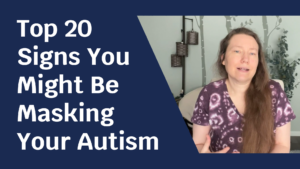What is autistic masking?
Autistic masking is when you compensate for, pretend, or camouflage your natural autistic tendencies, qualities, mannerisms, and socialization, in order to appear to be more neurotypical, to fit in to social expectations, or avoid consequences.
It is far more than simply adopting a social self in the way that almost all people do to some extent. It is in fact violating your own nature for the comfort of others, or as a means of protecting yourself.
I’m calling it “high masking” (in exchange for the term “high functioning”) when you are so used to masking/pretending/camouflaging your struggles in order to pass as “normal,” or to avoid attention, often to feel safe, that your real struggles and needs are not noticed and may even be discounted when you bring them up.
Masking comes at a high price
You may mask so much that you lose touch with what your needs and wants really are, how to tell what they are, how to tell what you genuinely like and dislike, and who you authentically are.
Masking requires an enormous amount of energy to:
a) suppress your authentic self
b) evaluate and predict what you think is expected of you in the given situation
c) perform as expected despite not having the things you need, and often in the presence of factors (often sensory) that are actively hurting your nervous system.
Imagine what you could do without using up all that energy on masking!?!
Imagine what you could do without using up all that energy on masking!?!
When you no longer have enough energy to sustain this constant drain, it often leads to autistic burnout, and/or serious physical and mental health problems, including anxiety and depression.
For some, the now-more-apparent-struggles finally lead to an autism/AuDHD identification that was missed earlier in life.
Not all autistics mask. Some autistics don’t mask much, some not at all. Some can’t. Some choose not to. Some used to but unlearned it (like me).
And at some point, once you’ve noticed that this is what is going on, you may want to investigate the idea of unmasking. I’ll write about how to do that in the next post, on how to unmask your autism.




